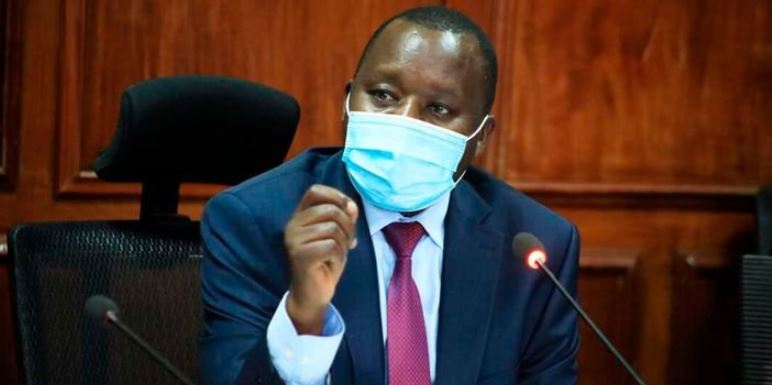
Under the annual public roads programme, all road agencies in Kenya – Kenha, Kura, Kerra and county governments are mandated to share their road maintenance and repair projects for specific funding by Kenya Roads Board directly from the fuel levy. What measures have you put in place to curb duplication of projects between Kerra and county governments? Dan Murugu, Nakuru City
The authority erects publicity boards at all our projects to highlight their details and assist the public to identify the responsible agency. We also publicise our ongoing and completed projects and work plans on various forums, including our website, on notice boards at our offices and on social media platforms.
Of the budget for rural roads, about 10 per cent is retained at the ministry. Who accounts for such monies? Shouldn’t Kerra receive the entire budget? Protas Wanjala, Kakamega
The budgetary allocations for the construction of new roads are determined by Parliament following submissions from the National Treasury for approval as per the law, while road maintenance is funded through the Road Maintenance Levy Fund (RMLF), which is administered by the Kenya Roads Board (KRB).
The law stipulates the respective road maintenance allocations for each implementing agency in the sector. Kerra, for instance, currently receives 21.8 per cent of RMLF, which is distributed to all the 290 constituencies (15 per cent equally and 6.8 per cent equitably).
The law provides for a 10 per cent RMLF allocation to the cabinet secretary responsible for roads, which is administered in consultation with the KRB based on requests from the various agencies and in line with the overarching Roads Sector Investments Plan (RSIP) as approved by our ministry in line with government development plans.
Roads in Ugenya, Siaya County, make one wonder if residents pay taxes. They all become impassable during rainy seasons and dusty when dry. Other than part of the Kisumu-Busia highway and Ukwala-Ugunja-Ruambwa Road, there is no single tarmacked road in the sub-county. What is Kerra doing to correct this situation? Joseph Otieno, Sega
Kerra has recently awarded the contract for the upgrading of Got Nanga-Jera-Bar Ober Road to bitumen standard, which traverses Ugenya constituency, at a cost of Sh1 billion, inclusive of the Performance-Based Roads Maintenance (PBRM) costs. The project is expected to be completed by December 2023. The authority also undertakes routine maintenance of roads in each constituency under provisions of the RMLF. This financial year, the authority targeted to maintain 133 kilometres of roads in Ugenya constituency, and work is ongoing with over 50 per cent currently complete.
It is important to note that the construction, maintenance and management of roads is a shared function between the national and county governments as per the constitution. As such, a majority of the roads within the constituency fall under the county government.
The national government has further cascaded the management of roads under its purview to Kenha, Kerra and Kura. The Ukwala-Ugunja-Ruambwa Road is, for instance, under Kenha.
Many taxpayers can’t access reliable information to enable them distinguish the roles of various government institutions, and yours seems to be one of them. How is your mandate distinct from that of Kenha? Komen Moris, Eldoret
The construction, maintenance and management of roads is a shared function as earlier illustrated. Under the national government, the three authorities created by the Roads Act (2007) are Kenya National Highways Authority (Kenha), Kenya Rural Roads Authority (Kerra) and Kenya Urban Roads Authority (Kura). Each has a definite mandate in the management of the national road network. The designated road network under the purview of Kerra was revised via the Kenya Gazette Legislative Supplement No. 2 (Special Edition) of January 22, 2016 and through further reclassification on May 8, 2020. Subsequently, the authority is currently managing 18,662 kilometres of national secondary trunk road network (Class C) as vested by the cabinet secretary. Kenha, on the other hand, is responsible for Class S, A and B roads (national trunk roads) while Kura oversees urban roads (roads within cities and municipalities). In addition, the Kenya Wildlife Service (KWS) oversees roads within national parks.
The Kenya Roads Act, 2007, mandates Kerra to manage, develop, rehabilitate and maintain rural roads. What has Kerra achieved so far? Andrew Maranga Ratemo, Nairobi
The country has achieved transformational change in the development of road infrastructure. As Kerra, our contribution to this transformation has been overseeing the implementation of the manifesto of the government in construction of 10,000 kilometres of roads by 2022.
Currently, Kerra has contributed to the surpassing of this target by completing over 6,000 kilometres across our 47 counties. This has enabled ease of access to resources and services leading to socio-economic development across our country.
In addition, Kerra has been a key enabler of the government’s Big Four Agenda through the construction of access roads to health facilities, factories, farms and various institutions. Through the implementation of projects, Kerra has provided opportunities for employment and earning of income from the harvesting of raw materials used in road construction.
In addition, the authority has been a key enabler of the governments’ agenda of providing opportunities for special groups (youth, women and people living with disability).
One of the major concerns in the road sector is the blatant variation of projects costs and completion timelines by both foreign and local contractors. How do you ensure that Kenyans get value for money in the projects amid the challenges? Dan Murugu, Nakuru City
Road projects as contracted by the government are civil engineering works, which follow national and international standards and as such are not subject to arbitrary variations. Variations in road works are occasioned by several factors such as unforeseeable changes in the natural environment, including geographic conditions, natural disasters and climatic changes. Other factors may include inflation and stakeholder input. On timelines, consideration of stakeholder input during project implementation and funding challenges are some of the significant contributors to project delays during implementation.
To ensure value for money, the authority undertakes rigorous supervision of contracts in line with contractual provisions and where it becomes necessary to vary a contract, we ensure that due process is followed. Additional contractual and administrative controls aimed at ensuring prudent use of resources entails the following; strict adherence to legal thresholds in approving variations, limiting variations to only essential works and consideration of the full socio-economic impact of any variation.
What has been the working relationship between Kerra and counties? Komen Moris, Eldoret
There has been close collaboration in the management of roads at both inter and intra-governmental levels. For instance, Kerra, which has a presence in all 47 counties, shares its Annual Road Work Programmes (ARWP) with the respective county governments for ease of planning and avoidance of duplication.
In addition, the combined work plans for the three authorities are also published annually by the Kenya Roads Board (KRB) for projects funded through the Road Maintenance Levy Fund (RMLF).
County governments can also enter into memorandums of understanding with the national government agencies like ourselves and Kura to undertake road works on designated sections of their road networks on need basis. We have also offered technical expertise to county governments upon being requested for the same.
Some of the challenges we face in relation to counties is the lack of harmonisation of respective tax regimes, which sometimes adversely affects projects that cut across several counties. This is, however, being addressed by the responsible agencies and has eased over time.
Source: Sunday Nation








